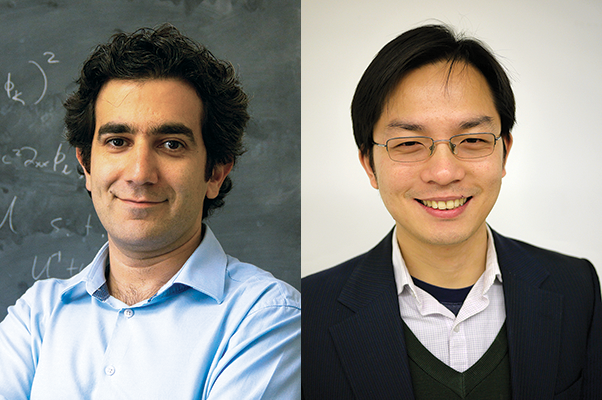Hafezi, Hu Named Blavatnik Finalists for Second Straight Year
For the second year in a row, two faculty members from the University of Maryland’s A. James Clark School of Engineering have been named Finalists of the Blavatnik National Awards for Young Scientists by the Blavatnik Family Foundation and the New York Academy of Sciences. Mohammad Hafezi and Liangbing (Bing) Hu are among 31 of the nation’s rising stars in science who will compete for three Blavatnik National Laureate Awards in the categories of Chemistry, Physical Sciences & Engineering, and Life Sciences; they are two of 11 Finalists in Physical Sciences & Engineering. Each of the three 2020 National Laureates will win $250,000—the world’s largest unrestricted prize for early-career scientists. “At Maryland, our goal is engineering that advances our profession and improves people's lives. The Blavatnik Family Foundation’s honor recognizes that Mohammad Hafezi and Bing Hu have done both,” said Robert Briber, interim dean of the Clark School. “We’re proud that our students and their teams can innovate in the lab with faculty at the leading edge of their disciplines. Congratulations to Mohammad and Bing, and thank you to the Foundation and the New York Academy of Sciences.” The Blavatnik Awards recognize the past accomplishments and future promise of the most talented faculty-rank scientists and engineers aged 42 years and younger at America’s top academic and research institutions. This year, the Blavatnik Awards received 305 nominations from 161 academic and research centers across 41 states. The three 2020 National Laureates, chosen from the 31 Finalists, will be announced July 22, 2020. Inspired by the concept of topology in mathematics, Hafezi is making pioneering contributions in the fields of nanophotonics and quantum optics. His innovative research is tackling a common challenge that has hindered the miniaturization and use of devices that use light-based components for decades: nano-scale fabrication defects that lead to random variations in device performance. Hafezi’s topologically-inspired optical devices have proven to be incredibly robust against nano-scale fabrication defects and, together with his theoretical work, have spurred the entirely new field of “topological photonics.” Hafezi is an associate professor with affiliations in UMD’s Department of Electrical and Computer Engineering, Department of Physics, Joint Quantum Institute, and Institute for Research in Electronics & Applied Physics. He is also a fellow of the Quantum Technology Center. Hu, a materials scientist and self-described wood nanotechnologist, explores the use of wood-derived nanocellulose—the most abundant biomaterial on Earth—as a solution to environmental sustainability challenges in energy and water. His work has led to the development of a unique processing procedure that can transform wood into a material that is as strong as steel but six times lighter. He has also developed transparent wood composites as a replacement for glass, photonic paper for future electronics display technologies, and a host of other wood-derived technologies ranging from batteries to water desalination and green building insulations. Hu is a professor with affiliations in the Clark School’s Department of Materials Science and Engineering and Maryland Energy Innovation Institute. He is also the director of the new Center for Materials Innovation. This year, Hafezi and Hu are joined in the Physical Sciences & Engineering category by fellow University of Maryland Finalist Mohammad Hajiaghayi, a professor in the Department of Computer Science. Due to the COVID-19 pandemic, the annual Awards ceremony and gala dinner in honor of the 2020 Blavatnik National Awards Laureates and Finalists typically held each year in September will be postponed to 2021. For updates about the Blavatnik Awards, visit blavatnikawards.org.
June 17, 2020 Prev Next |
|


